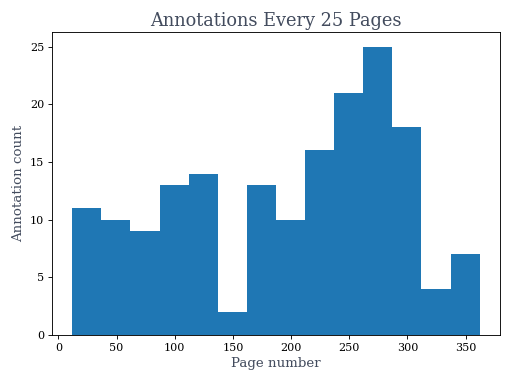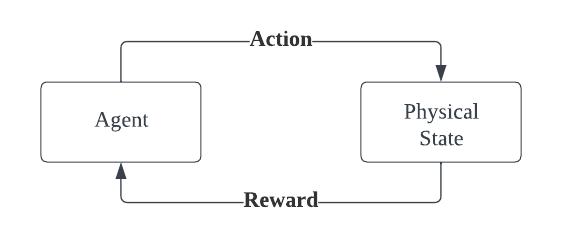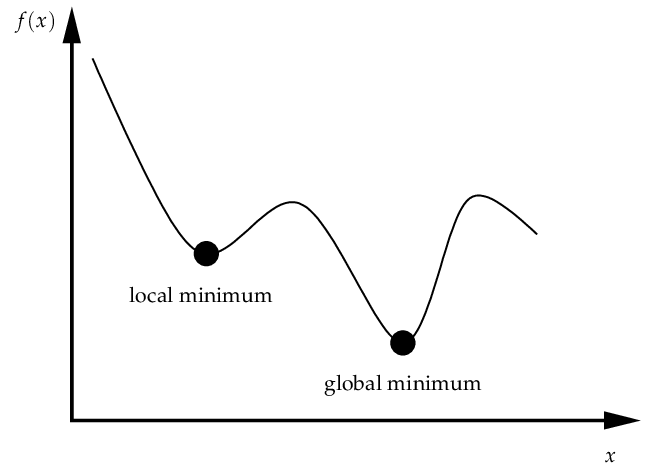Bullshit Jobs: A Theory gave me a lot to think about. Not just about my own job. David Graeber shares countless anecdotes selected from the hundred or so people he interviewed in his research. Unsurprisingly, it’s disheartening to read the stories of people who hate what they do for a living, so around halfway through my interest started to waver. Fortunately, I found the last third of the text quite insightful, which is easy to see on the plot below. At some point I was annotating something on nearly every page!

Graeber defines a bullshit job (BSJ) as:
a form of paid employment that is so completely pointless, unnecessary, or pernicious that even the employee cannot justify its existence even though, as part of the conditions of employment, the employee feels obliged to pretend that this is not the case.
The decision to only recognize a job as bullshit if the person performing it finds it as such is brilliant. It conveys a respect for each individual’s personal experience, which is often lost when zooming out and trying to assess larger systems as a whole. It shouldn’t matter if others think your job is important; if you think your work is pointless but are stuck doing it, that’s a problem worth solving.
Generalizing Graeber’s Taxonomy
The author presents a taxonomy for BSJs (the names are a bit silly):
- Flunkies: people employed for the sake of someone having employees. Think of a personal assistant who has maybe thirty minutes worth of tasks per day, but is paid for a full forty-hour work week and is required to look busy by the “big boss who now has his own assistant”.
- Goons: flunkies with an aggressive element. These are jobs that exist to thwart conflicts created by the negative tendencies of other humans (greed, violence). Consider how armies deploy soldiers to a geographical region with no reason other than the effect created by their presence.
- Duct-tapers: people tasked to fix an aspect of the system that should have a more efficient solution, but that would require a re-design at a lower level. Think of the massive teams banks have been hiring for decades to comply with regulations, instead of building a compliant system to begin with. This also happens frequently in the software industry, where incompatible systems are forced to work together through great human effort - the sign of a bad (or missing) architect.
- Box-tickers: people employed only to provide evidence of working towards a goal, without any plan to achieve it. Essentially, some entity needs to be satisfied for the continued existence of the organization, so employees are kept to tick that requirement. Again, the compliance industry fits snuggly in this class.
- Taskmasters: the generators of tasks that underlings with BSJs have to complete. Consider a manager that wants to keep their team and themselves employed regardless of whether the work is bullshit.
Local Optima
I was a bit underwhelmed by the taxonomy because the classes are not well separated. Thus redunctionist in me couldn’t help try to condense it with a proper abstraction. This is what I came up with:
BSJs are the manifestation of a more general problem - being stuck in a local optimum - and the reasons for their existence vary based on scale.
Two assumptions are needed to properly convey this model:
- the state of a person or group of people within an environment can be encoded as a point in a multi-dimensional space (for example, a 150-dim vector representing the human state, and another representing the environment state)
- the goals and desires of a person, or the ideology guiding a group of people, is represented by a scalar potential function in this space, such that they move along its vector field

This is effectively a reinforcement learning setup, with one major difference - the agent can affect the functional they are optimizing.
Our perception of the function we are optimizing depends on the time scale. Over a few seconds this might be as simple as scratching an itchy spot. Over a few hours it might be to find food or water to have energy. Where it gets interesting is at the scale of months and years. These are what we’d consider our ideals; a vision for the person we would like to become.
Consider a basic example where our state is one-dimensional (the $x$-axis in the diagram below). If one starts at the top left and follows the gradient along the potential curve $f(x)$, they will settle at the local optimum. It’s sub-optimality is obvious, and we’d like to do better!

There are only two ways to escape:
- Take a large step to the right and follow the curve down to a global optimal state.
- Transform the function, e.g. rotate counter-clockwise, to improve your state’s value.
These methods can seem very different at different scales of human organization, but they are quite fundamental.
Scale: 1e0
Let’s examine this from the perspective of one person. Ideally, one should learn and grow throughout life without having to think about it - much like a child. In contrast, a BSJ represents a situation where no matter in which direction a person steps, they will end up in a worse situation than their current one. Millions languish in the safety of a salaried job whilst avoiding the risk inherent to pursuing skills that require great commitment for little short-term return.
Let’s take a look at our options:
- Take a big step out of the stationary point, hopefully setting you on a new path. The direction can be random, e.g. by partaking in new hobbies or just picking a new book from the bookstore. You could also reflect on what you are most passionate about and take a more targeted approach to investing your time. However, it is often difficult to disambiguate personal passion and actual competence. Some give up their path to a steady desk job to study fashion abroad, and never succeed.
- Reframe the function you are optimizing in such a way that your current role becomes a stepping-stone. This might seem like cheating, but is totally valid because it requires you to be honest with yourself; perhaps the role you were hired is entirely different than expected. Rather than dreading your job for what it could have been, find new ways to expand your skillset. There are always opportunities for growth.
At this scale we most easily identify flunkies and taskmasters, as Graeber would call them. These are people that perform bullshit and bullshit-generating jobs out of fear or incompetence. It’s scary to think of the millions of people whose ambitions were never realized as they transformed their BSJ into a personal global optimum.
In short, you can either change your environment or your perception. It’s no surprise then that it’s popular to escape reality by binging TV shows or playing video-games. They provide us with a convincing change in environment without requiring us to change ourselves. Meanwhile, drugs like alcohol alter how we perceive reality. Both are temporary solutions that do not lead to a fulfilling life.
Scale: 1e3
Organizations with thousands of humans can range from educational institutions to mega-corporations. When they are stuck in a local optimum, we see a rise in bullshit-ization.
Graeber discusses at length how different the ideology of Western universities is today compared to a century ago.
Compliance Indstry: companies have reached a local optimum with their existing ideology and system architecture. when the environment changes, rather than diversifying, they try to alter the perception of their potential function, creating jobs like duck-taping and box-ticking. However, they fail and instead waste resources, because the original potential function was too ingrained in the company’s culture. Ideally you reinvest your profits into revamping systems with the newest research and methods, which is making that change in your state.
schools: simulated studying without critical thinking
corporations: rebranding, diversifying services
Scale: 1e6
At the scale of millions, we have to consider the types of labor more generally.
If your goal is to understand the universe, then it makes no sense to follow an ideology where manual labor is valued higher than spending your day deep in thought. “Work, Aristotle insisted, in no sense makes you a better person; in fact, it makes you a worse one, since it takes up so much time.”. On the other hand, in times of . “In Northern Europe in the Middle Ages and the Renaissance, almost everyone was expected to get their hands dirty at some point or another. 30 As a result, work, especially paid work, was seen as transformative.”
With millions of people we’re discussing nations. Graeber describes a
When Germany experienced it’s depressive period in the 1930s, they saw the rise in radical ideas, ultimately leading to WW2.
Communism vs capitalism
Lincoln argued that, owing to America’s rapid economic and territorial expansion, it was possible there to maintain something like the old medieval system, in which everyone started out working for others, then used the proceeds of wage labor to set up shop, or buy a farm (on land seized from its indigenous inhabitants), and then eventually themselves play the capitalist, employing young people as laborers in their own right.
when a profit-seeking enterprise is in the business of distributing a very large sum of money, the most profitable thing for it to do is to be as inefficientas possible.
This also is related to general human sins like greed and pride leading to the need for militaries and fascism.
Are we in a sub-optimal state on the capitalist potential function? Perhaps we need to become socialist for a bit, then return when it’s useful.
Scale: 1e9
We have yet to organize all humanity under one ideology., but I’m still adding this because it’s funny to think about. If humanity as a species is stuck in a local optimum, nothing short of a massive disaster can force us out of it. This could be nuclear war, global warming, ecological collapse… even an alien invasion. That’s just evolution.
Puritanism and Service Life-Cycle
popular Protestantism, drawing on its Puritan roots, not only celebrated work, but embraced the belief that, as my fellow anthropologists Dimitra Doukas and Paul Durrenberger have put it, “work was a sacred duty and a claim to moral and political superiority over the idle rich”—a more explicitly religious version of Carlyle’s “gospel of work” (most historians simply call it “producerism”), which insisted that work was both a value in itself and the only real producer of value.
AI Overlords
Value of a human in Puritan views was based on their ability to create and build. But what happens when society has become too advanced for certain individuals to create anything of use? We can’t get rid of these people and the rest of society still benefits from the Puritan ideals, so we just invent BSJs for them. However, there is a critical point. When too many people are doing BSJs, the cost of maintaining the non-useful humans will be too great. There will need to be a way to filter them out, or minimize their detrimental impact on progress. This is the case for UBI. Have an elite class that has access to the latest technologies and automation methods as well as resources for creating things - the capital. However, also provide the lower end of society with a minimal amount of value, such that they don’t just starve and die. This is in line with values.
We live in a feudal state. The majority does little to nothing, but is kept busy under the illusion that they provide value. Meanwhile, the ones that hold the capital and are intelligent enough to keep it fund human progress and effectively do the real work.
Steel magnate Andrew Carnegie was a leader of this cultural campaign. To the masses, Carnegie argued for what we’d now call consumerism: the productivity of “concentrated” capital, under the wise stewardship of the fit, would so lower the price of commodities that the workers of tomorrow would live as well as the kings of the past. To the elite, he argued that coddling the poor with high wages was not good for “the race.
Value vs Values
we tend to make a distinction between “value” in the singular, as in the value of gold, pork bellies, antiques, and financial derivatives, and “values” in the plural: that is, family values, religious morality, political ideals, beauty, truth, integrity,
On Work and Play
Given all the hype around AI in the media and an increasing fear of automation among the public, I thought it would be interesting to consider how soon each type can be replaced by an algorithm.
- dexterity
- human care
TODO:
- simulating labor due to over-reliance on imprecise metrics
- not actually caring about the end-result, just the “motion”
- mis-aligning with the goals you are given
- authority through fear, not respect
- cowardice and lack of skills to compete in the “real world”
Ideas that struck me:
Taxonomy of bullshit jobs: perhaps overly long, but I’ll summarize and I relate to the examples.
the argument that bullshit jobs come from inefficient government bureaucracy rather than the efficient private corporations
Our sense of self comes from our ability to identify ourselves as the cause of change. The example is how positively babies respond to having an effect on the world - essentially creating physics experiments and figuring out models in which they control certain factors. Perhaps this is why studying control theory excites me?
Socialism vs Capitalism (or is it libertarianism??) - writing was quite all over the place. one is about an ideal human society, the other about succumbing to evolution. Based on history, the solution probably lies in between the two - hence UBI.
Left vs Right - the bipartisan politics in the US as a struggle between values (human, qualitative) and value (machine, quantitative). The definitions are basically the two extremes of the methods of interpretation humans can employ (emotions vs logic).
establishing positive feedback loops in life
politics vs economics - need to reread
religion: should we aim for happiness or accept that to live is to suffer?
managers as sadomasochists - connecting to domination as a fetish - but irl we don’t have a safeword
corporate world as a feudal structure? spiritual violence?
Puritans were hard workers that followed a service life-cycle that could only be sustained as long as the number of masters could grow over time (sufficient resources for adults to obtain their own land or shop). However, nowadays we are way past that point, so the majority of humans in the West only reach full adulthood (end of the cycle) upon retirement. I am fascinated by this cycle and would like to model my life around it in a way…
personal view: there are no bullshit jobs. only shit jobs and bullshit people
By the end of the book I was feeling optimistic. I had been reminded that humanity has gotten away with being messy and inefficient thus far, but also look at how far we’ve come! The notion that mankind should be tamed by a strict regime that enforces some idealistic rules seems absurd given how noisy the gradient of human progress is. It is not something that can be tamed, only nurtured, and bullshit jobs are just an inevitable part of this noise. That’s not to say that the free market is efficient. The solution of course is both never exactly attainable, and somewhere in between.